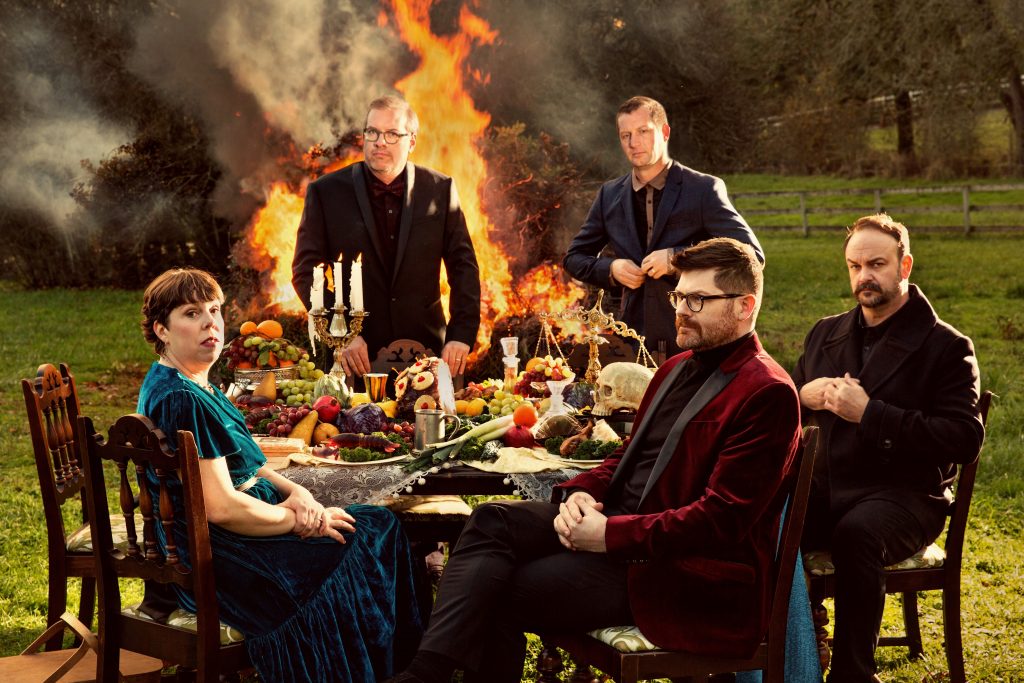
Photo: Holly Andres
The Decemberists had big plans for 2020. They announced a series of 18 dates across the US for their “20 Years Before The Mast” tour celebrating their 20th anniversary as a band. Like so many of us, their plans completely changed. Touring is still on hold, but The Decemberists still wanted to give their fans an opportunity to celebrate the band’s formation with a series of three online shows, the last one happening this Sunday, April 25th at 7 p.m. CT. Singer Colin Meloy took a moment to discuss the virtual anniversary shows, his experience during the pandemic, and highlights from the band’s two-decade history.
It’s the 20th anniversary and you had to cancel the summer tour because of COVID but you are going to be live streaming concerts, the next three Sundays. And I read you’ve got different set lists planned for every show. Yes?
Yeah, that’s true.
Where are the concerts emanating from?
They’re streaming from this place called the Bodecker Foundation, which is a kind of community event space in Northwest Portland. There’s a studio that our guitar player, Chris Funk, runs. So that’s where we are.
Do all the bandmates still live in the same general area?
Yeah. We’re all Portland area.
For all these varied set lists, how much practice time do you have to put in now?
Well surprisingly, because of COVID protocols, we were a little bit hamstrung about how much rehearsal we could do, because we were pretty strict about that and we were quarantining prior and stuff like that. So, it was a lot of woodshedding at home. And then kind of rehearsal, little bit of rehearsal today of show distanced in the space, and it’s surprising how well you can play. I mean, there’s so much of it as muscle memory. I mean, a lot of these songs we had played so much and in some ways I feel like it’s a refresher. You know, you kind of fall into patterns when you play the song over and over consistently, like coming back to it after a few years. There’s sort of new discoveries and a little bit more excitement, maybe ‘cause sometimes a song that you played a gajillion times on a tour will inevitably develop kind of a little bit of dull sheen to it, you know? So it’s nice to come back to them and be excited to play them.
Do you come back and sort of mix it up at all or do you change the instrumentation a little bit or maybe play it differently?
We couldn’t really afford, we didn’t really do that. I mean, we do…the third show is actually, and I don’t know that we’ve made this public, but it’s all kind of acoustic. So those are pretty radically different arrangements in some of the songs. Other than that, we’re playing them kind of, I mean, they’ve kind of developed lives of their own in their live forms as the years have gone by. So that’s what we’ve done.
Still on that, on the concerts coming up, are you going to do it chronologically? Or will you be mixing it up?
It’s all mixed up. Yeah. We didn’t want it, because we know that some people are going to get one show or maybe just a couple. So, I think the idea was to have it each show be kind of represented like a bit of a cross section of our career.
Yeah. I have seen y’all the last two times the Decemberists have been in Dallas. Both of those were at the now 100-year-old Majestic Theater. I love the sound there and it’s always a treat, but your first two shows in Dallas were at the legendary Deep Ellum club Trees in June ‘04 and March ‘05. What do you remember about those shows at Trees?
I remember there was a tree on stage, like right in the middle of the stage. Then I also remember going to get really good barbecue near there. And that’s kind of the extent of it. I remember the shows being fun and I remembered being aware that Trees was a legendary venue and being excited to play there. I do remember that.
So we’ve all had to put a lot of things in neutral during this COVID time and I’m a dad of an 11- and a nine-year-old and it’s been difficult for them and for us doing all this, what we do here at radio stations. But, I know that I will secretly look back on this time and I will cherish how close we’ve been this past year, with my wife and my daughters. Will you look back and remember anything positive about this past year or this era? Have you enjoyed anything about being here?
I mean, it’s hard. As you know, it’s sort of hard to talk about that since after what a scourge this virus has been. Thankfully, I have not known anyone who has died. I’ve known people who have gotten pretty sick and in that sense, I feel like I’ve been spared and fairly, you know, knock on wood because we’re not out of it yet, even though you Texans may think otherwise.
You can put me in that group, but yeah, we’re still masking here.
Yeah, yeah. I figured that was the case. I’m a home body at heart and a bit of an introvert. So for those of us introverts out there, like this, there’s always been this kind of secret side of this. That’s like, “Oh yeah, I could get used to this,” you know?
Don’t have to make up excuses to stay home now.
Yeah, right. Even though I love my friends and dinner parties and things like that, it was like having all of that off the table, there was just having these open days. Once you got past that initial flush of terror, and once you felt like your community was doing – I felt that Oregonians were really stepping up and trying to be safe, particularly in the Portland area – there’s some of this I could get used to. But I don’t think there’s anything wrong with that. Like looking at what we learned from this, the positives of it and bringing it into our sort of post-pandemic lives and being okay with being like, “I don’t feel like going to that party.” And that’s okay. And people will understand.
Also, like you said, being around your kids, oh my God. It has its moments of being a curse, but by and large, even though my kid is back in school, they’re doing like outdoor school four days a week. There’s something about that. I got to know his curriculum and I got to know his teachers better, and I was there in the classroom every day and that was kind of cool.
My wife has kind of become the co-teacher and the IT professional. Ours are still connected learning. I’ve just told them, you’re just gonna look back on this time and it’s going to be, you know, the year I did sixth grade or third grade at home.
Yeah. It’s going to be weird.
It’s a strange thing to think back on.
I think of this often because when I was in first grade, the same age as one of my kids last year, when Mount St. Helens erupted, I lived in Helena, Montana. The ash blew all the way from the mountain in Washington to Montana and covered the town in ash. I remember that waking up whenever it was, an April day or whenever it was, and looking out the window thinking it’s snowed, but it was just ash on the ground. And then everybody wearing bandanas for the next, I dunno how long it took to clean up all the ash, but not that long. It was like a week or two, but everybody was wearing bandanas. To this day, the smell of bandana, fresh fabric against my face reminds me of Mount St. Helens. And I’m immediately brought back. So I can only imagine what our kids, just smelling mask fabric or all the various things that they’ve gotten used to. And as time passes, what will bring them back to that.
So I listened to the entire King Is Dead this morning, driving in. I live about 45 minutes away. And I just love the song “June Hymn” so, so much, it’s so evocative and lovely. And as I’m listening to it, I wonder if that just came to you in a flurry, like I imagine it did…sitting on a porch, just this bucolic lovely scene, and you just write these words. Am I right at all on that?
You are kind of right. Yeah.
What was going on when you wrote that song?
Well, I actually think of that song as being, in some ways, like a turning point of what became sort of the overarching theme and feel of that record. And in many ways, I feel like in my mind that record kind of revolves around that song because I remember, I think it was a sunny spring day and I don’t know that I was sitting outside, but I was definitely looking. I was in awe of what was happening around me. We had just moved from Portland proper out into just north of town, into the woods, on Springville Road which I called Springville Hill. I don’t think it was ever named that, but it was off Springville Road up in the woods a little bit. And it was this, I think in some parts that transition of moving out of Portland into the woods, also coming out of where I was at when I was writing “The Hazards of Love,” which was kind of in a bit of a darker space.
And so having toured “The Hazards of Love,” having kind of worked that out of my system and then moved to this kind of bucolic area in the woods with my wife and my kid, I was suddenly moved to want to write music that’s pretty, I want to write some pretty music. You know, I’m feeling taken in by this surrounding, by this change in my life, and want to write pretty music. I don’t want to write dark, scary music about killing children. I want to not only move away from those characters but move away from characters altogether and focus on myself and see what’s going on. What’s around me. And so I wrote that song pretty quickly. That’s sort of the thesis of this record, I think.
Well, I’m glad I imagined correctly.
Yeah. Well I think even though that’s a very kind of romantic and sentimental thing, it’s not far from the truth. I hate to say it.
How do you decide on instrumentation? Like when is it time for bouzouki or pedal steel or Hurdy Gurdy? Do you just hear it or does it happen when the band gets together?
Well, I mean, those are different, so I’m the bouzouki-ist. And so bouzouki was introduced to the band at a time when I felt like I just wanted to, I was going to experiment, bringing in some other instruments, see if that kind of gets some creative juices flowing, just trying to change up instrumentation. ‘Cause often, sometimes all it will take is moving from 6-string to 12-string or working in a different tuning and all of a sudden where you thought you were blocked, like all of these ideas present. So I actually was in the midst of writing songs for “The Crane Wife” and thought as an exercise that I would just buy a couple of cheap instruments. One of them was a bouzouki and one of them was a mountain dulcimer, like a lap dulcimer. And I have both those instruments too.
And the lap dulcimer, I never really jelled with that much…like what Joni Mitchell played, like early, early days. I could never quite find my way with the mountain dulcimer, but the bouzouki for some reason immediately kind of spoke to my sensibilities. And I think I wrote “Crane Wife 3,” well though I wrote “Sons and Daughters” first because that only has two chords in it. And I only knew two chords. And then I learned a third chord and that’s “Crane Wife 3” which has three chords on it. So I kind of expanded from there. So that’s where that came from. As far as like hurdy-gurdy and pedal steel, that’s all Chris Funk’s doing, and he will bring these two into rehearsal and he is avid, it’s almost like ADHD when it comes to instrumentation. You know, he’s always jumping around from instrument to instrument. So that was his doing.
Yeah, he does that during shows. So I thought that he probably had that sort of influence on you. On the album, What a Terrible World, What a Beautiful World, how did it come to be that, “A Beginning Song” was placed as the last track on that album?
If you call a song “A Beginning Song,” it’s either going to go at the beginning or the end and I already had had the idea of it opening with “The Singer Addresses His Audience.” “A Beginning Song” is not really about beginning a record. I think an alternate title for that was “A Beginner’s Song” because …I don’t want to get too metaphysical here, but I was getting into meditation at the time and you get this concept of the beginner’s mind, finding your way to where, you are a beginner in all things, you are finding your way, looking at things new in this sort of idea of being in the moment, central premises of mindfulness. And I feel like that song is about me trying to find my way in the midst of that. And so in that sense, it is me trying to find my way into that beginner’s mindset mentality. And in that sense it’s a good ending song.
Yeah. I kind of thought you might say something like that because “The Singer Addresses His Audience,” that has to be the first song on that record. And then “A Beginning Song.” I had it sort of pegged as sort of a metaphorical beginning.
And that was a hard record to sequence though. It took like two months to sequence that record.
So “The Mariner’s Revenge” was on Picaresque. Both times I’ve seen you, it’s your show finale. How did that become the standard concert closer?
I don’t think we ever envisioned it as being that, when I wrote it and we recorded it, it was still kind of an experiment. And I remember Chris Walla who produced that record was pretty much like, that’s good, that’s awesome. But it shouldn’t go on the record. That should be a B-side or an EP or something like that and we kind of pushed against him. I feel like there were two forks in the road. There was “The Mariner’s Revenge” song on the record and it’s not, and we put it, we went “It’s on the record,” despite Chris Walla’s objections. I think inevitably if it had not made it on the record, once we started playing it live and it kind of developed into its own monster on stage, I think there was kind of no going back from that.
And then where are you going to put that? Where are you going to put that if it’s not at the end? And so it’s either been at the end of the set or the end of the encore. We’ve only done it at the beginning once, at Bonnaroo one year, we just were like, let’s just see what happens. And we came out and it was the first of the set and it was just baffling…did not work at all. You really have to ramp in, but you have to kind of win people over before you’d knock them on the head with something like that.
Is it a pain traveling around with that whale?
We have crew that deals with it, so you’d have to ask them that. The inflatable whale, like the newest version of the whale, initially had a drone on it and it was going to be a remote control one, but our production manager on the first show of that tour in 2018 was like “there’s no way.” I showed up for soundcheck and he had been trying it out in the empty venue. And he was like, there’s no way. It’s just like any amount of wind would blow it, you know? And then it would get out of control. It’s hard to control that. And then it would dive down and it had these whirring blades on it for the drone. And he was like, this is just not safe. So we had to do helium and our whale wranglers, which I think ended up being the better way.
Good. So you’ve been working on stuff for a new record?
Yeah, well, you know, I’m always tinkering. I’m working on a book right now and some other projects which may take up some time, but writing music for me has never felt like a job. Even when I wasn’t in a band, I’m writing. It’s just something I do habitually. So I’m always writing. And so once I’ll get to that point, like with “June Hymn,” like this, is shaping around this, then let’s move forward. Once I get there, I’m sure we’ll be back in the studio again. Yeah.
Right. Really appreciate your time here. I’ll be watching Sunday. So looking forward to it.
Yeah. Hope you enjoy it. Great.
Eric is a KXT weekend host and the Director of Radio Operations for KERA 90.1 and KXT 91.7.
Our work is made possible by our generous, music-loving members. If you like how we lift up local music, consider becoming a KXT sustaining member right here.




